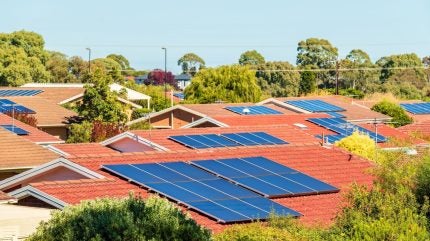
Germany’s solar industry has raised concerns over a proposal by Economy Minister Katherina Reiche to end feed-in subsidies for new small-scale rooftop photovoltaic (PV) systems.
The sector has cautioned that such a move could risk national climate targets, as reported by Reuters.

Discover B2B Marketing That Performs
Combine business intelligence and editorial excellence to reach engaged professionals across 36 leading media platforms.
The feed-in subsidies were introduced in 2000 to support the growth of the solar power sector by ensuring a fixed price for renewable energy producers who sell their electricity to the grid.
These subsidies have contributed to Germany’s goal of sourcing 80% of its electricity consumption from renewable sources by 2030.
However, the country currently faces challenges, having experienced two consecutive years of economic contraction.
As the government seeks to increase defence spending, revitalise industry and upgrade ageing infrastructure, its finances are under considerable strain.

US Tariffs are shifting - will you react or anticipate?
Don’t let policy changes catch you off guard. Stay proactive with real-time data and expert analysis.
By GlobalDataKatherina Reiche stated that public funding is no longer necessary for new small rooftop PV installations, which primarily benefit private households, declaring: “New, small PV systems are already profitable in the market today and don’t require any subsidies.”
She also mentioned that system operators could help cover some of the expenses associated with the grid expansion needed to increase support for solar power generation.
Carsten Koernig, the head of the German solar industry federation, stated that the subsidy offers essential security for financing banks.
He further noted that without this support, only four out of ten customers would be inclined to invest in a solar power system for their homes.
Koernig said: “The subsidy is already clearly paying off for society as a whole.”
Enpal, a Berlin-based renewable energy company, highlighted that the government should enhance the appeal of rooftop solar capacity for small producers to achieve its renewable power generation targets.
A company spokesperson stated: “What is beyond question is that this requires a reliable regulatory framework.”
Reiche’s proposition comes as demand within the sector is slowing due to rising interest rates, a changing political landscape and economic uncertainty.
It also appears contradictory to earlier agreements made between her conservative CDU party and its coalition partners, the Social Democrats (SPD).
SPD energy policy spokesperson Nina Scheer stated: “We agreed in the coalition agreement that we want to make private households the actors in their own energy supply.
“We now need progress in the expansion of storage and not uncertainty.”
Germany saw a significant increase in energy consumption during the first half of 2025.
Energy usage reached 187.3 million tonnes of coal equivalent – a 2.3% increase from 183.1 million tonnes in the same period of 2024.



